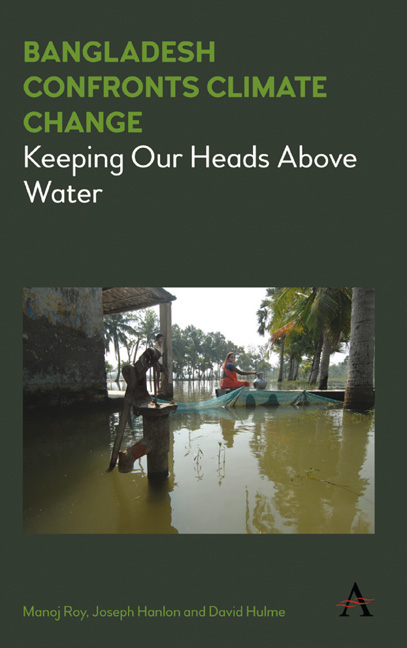Book contents
- Frontmatter
- Content
- List of Illustrations
- Abbreviations, Acronyms and Bangladeshi Terms
- Acknowledgements
- About the Authors
- Chapter One Actors, Not Victims
- Chapter Two How Will Climate Change Hit Bangladesh?
- Chapter Three Taking the Lead in Negotiations – and Moving Forward
- Chapter Four Sea Level Rise and the Vulnerable Coast – Where Farmers Know More than Engineers
- Chapter Five Saving Lives with Cyclone Shelters
- Chapter Six Living with Floods
- Chapter Seven Agronomists Keeping Ahead of Climate Change
- Chapter Eight No Climate Change Migrants – Yet
- Chapter Nine How Can the Privatized Megacity Cope with Climate Change?
- Chapter Ten Is Climate Change Only a Problem for the Urban Poor?
- Chapter Eleven Power – Political, Financial and Electrical
- Chapter Twelve Bangladesh on the Front Line of Climate Change
- Index
Chapter Eleven - Power – Political, Financial and Electrical
Published online by Cambridge University Press: 22 July 2017
- Frontmatter
- Content
- List of Illustrations
- Abbreviations, Acronyms and Bangladeshi Terms
- Acknowledgements
- About the Authors
- Chapter One Actors, Not Victims
- Chapter Two How Will Climate Change Hit Bangladesh?
- Chapter Three Taking the Lead in Negotiations – and Moving Forward
- Chapter Four Sea Level Rise and the Vulnerable Coast – Where Farmers Know More than Engineers
- Chapter Five Saving Lives with Cyclone Shelters
- Chapter Six Living with Floods
- Chapter Seven Agronomists Keeping Ahead of Climate Change
- Chapter Eight No Climate Change Migrants – Yet
- Chapter Nine How Can the Privatized Megacity Cope with Climate Change?
- Chapter Ten Is Climate Change Only a Problem for the Urban Poor?
- Chapter Eleven Power – Political, Financial and Electrical
- Chapter Twelve Bangladesh on the Front Line of Climate Change
- Index
Summary
Bangladesh government has taken the lead on climate change, playing a key role internationally (Chapter 3) and being among the first developing countries to write action plans. Most money for climate change adaptation has come from government. Donors and lenders have been slow to offer funds, and angry disputes with (and between) donors trying to assert control means some of the offered donor funds were never released – money actually had to be given back to Britain. But the government's leadership position has been tarnished by its own misallocation of funds, by its failure to improve processes of governance (especially in Dhaka and Chittagong) and by the approval of coal-fired power stations which will increase greenhouse gas emissions.
In 2005 the Ministry of Environment and Forest produced the ‘National Action Plan on Adaptation’ (APA). In 2008 this was transformed into the ‘Bangladesh Climate Change Strategy and Action Plan’ (BCCSAP) which was the first to be produced by a developing country. In the BCCSAP, Bangladesh opted for a ‘pro-poor Climate Change Strategy, which prioritises adaptation and disaster risk reduction.’ It has two key aspects. First, it is developmental, stressing the need ‘to eradicate poverty and achieve economic and social well-being for all the people’. Second, the plan recognizes that climate change is part of a continuum of climate pressures, and thus stresses the need to ‘scale up’ existing investments. The Action Plan part of BCCSAP is based on ‘six pillars: (1) Food security, social protection and health; (2) Comprehensive disaster management; (3) Infrastructure development; (4) Research and knowledge management; (5) Mitigation and low-carbon development; and (6) Capacity building and institutional development.’
Because climate change amplifies existing climate issues, it is almost impossible to identify specific climate change spending. Are building more shelters and planting trees along embankments actions to protect against present cyclones, or actions against the stronger ones expected under climate change? The government spends $1 bn per year – more than 6 per cent of the government budget and 1.1 per cent of GDP – on what the International Centre for Climate Change and Development (ICCCAD) in Dhaka calls ‘climate sensitive activities’. Of this three-quarters is domestic resources and onequarter from foreign donors (of which nearly all are loans, not grants).
- Type
- Chapter
- Information
- Bangladesh Confronts Climate ChangeKeeping Our Heads above Water, pp. 151 - 160Publisher: Anthem PressPrint publication year: 2016

